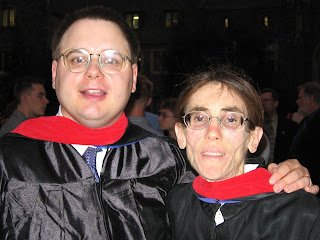Isaiah 61:1-2 "The Spirit of the Sovereign LORD is on me, because the LORD has anointed me...to proclaim the year of the LORD’s favor."
[Adapted from my New Year's Day sermon]
There has been a fair amount of hubbub about 2012 already, maybe more than for any year I can recall since 2000, what with all the talk about the end of the world and all. But let's place all that aside and focus on something productive. What will this new year hold for us? It may seem to be a question every new year brings, but what can we do about the answer? What can we do to make 2012 better than 2011? How can we make our lives more meaningful and productive, how can we grow and help others to grow, in this coming year?
I think we can start by looking at a short passage from the Prophet Isaiah:
The Spirit of the Sovereign LORD is on me,
because the LORD has anointed me
to proclaim good news to the poor.
He has sent me to bind up the brokenhearted,
to proclaim freedom for the captives
and release from darkness for the prisoners,
to proclaim the year of the LORD’s favor
and the day of vengeance of our God,
to comfort all who mourn,
and provide for those who grieve in Zion—
to bestow on them a crown of beauty
instead of ashes,
the oil of joy
instead of mourning,
and a garment of praise
instead of a spirit of despair.
They will be called oaks of righteousness,
a planting of the LORD
for the display of his splendor.
As we read these words, we need to remember that they are not really the words of Isaiah. Instead, he is prophesying a future message of the Messiah. Did the words sound familiar? If so, that might be because they show up again in the Gospel of Luke, Chapter 4. Jesus arrives in his hometown of Nazareth and goes to the synagogue, where he stands up to read from the scroll of Isaiah. He automatically find this text to read, and after reading the first few lines explains to the people, "Today this scripture is fulfilled in your hearing." To say the least, the people were not convinced. It would not be the last time that Jesus' promises would be ignored.
In this passage out of Isaiah, five kinds of people are being addressed: the poor, the brokenhearted, captives, prisoners, and those who mourn. Are we poor in spirit? Are our hearts broken in some way? Are we captive to sin? Are we bound by the darkness and snares of this crazy world? Do we mourn lost dreams? If so, then this message applies to us. The good news is that Jesus is anointed to address these issues. He brings good news to the poor, binds up broken hearts, releases prisoners from darkness, proclaims the year of the Lord's favor...
The year of the Lord's favor? What does that mean?
"The year of the Lord's favor" simply denotes a new era of blessing. It is not confined to a specific time in history or even a specific period of time. It is available to all people, at all times. Jesus speaks it into being, literally, by proclaiming it, both in Isaiah's prophecy and through his promise at Nazareth that the scripture is fulfilled. The year of the Lord's favor is there for the taking. The question is whether we will accept it.
The human race has a terrible tendency to rely upon the self, and not upon the maker. Our churches are great examples of this. In Asia, Africa, and in many other places, despite adversities such as poverty, oppression, and poor infrastructure, churches are booming due to trust in God. It is no great news for a church to triple in size in a year, or spawn new churches in nearby communities. And yet in the seemingly "Christian" West, with wealth, freedom, and established buildings, leadership structures, and everything else we might think necessary, it is usually an accomplishment if church growth outpaces deaths and drop-outs at the end of each year. Why? Because far too often our established churches and their denominations rely on programs and committees to do what God does best -- change lives.
Every time the ancient Hebrews believed in God's blessings, blessings were showered upon them. Every time they tried to succeed on their own, they met with utter failure. There are no exceptions in the whole of the Old Testament to this simple fact. What's more, they never, as a whole, learned the lesson. Perhaps more amazingly, neither do we. Where is our faith? Where is our common sense, even? If we can call upon the creator of the universe and judge of the world for aid, why on earth do we try to do things on our own? Why rely on our own fragile and finite selves when we can rely on God Most High?
So here we are, in 2012. As we think back upon all God has brought us through, look ahead at all He can still do. Remember that He wants to bless us, to change us, to redeem us, to refine us. Let us make the decision that this will be the year; that starting today, we will heed the promise of Jesus and accept
the year of the Lord's favor. Jesus has proclaimed it, so let it come, let it be as he has promised. Let this be the year that you open your heart, your mind, your soul, your life to God, to be changed forever.

